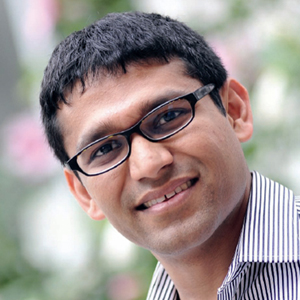Professor Goyal Wins NSF CAREER Award
Vineet Goyal, assistant professor of industrial engineering and operations research, has won a National Science Foundation (NSF) CAREER Award for his research on designing data-driven tractable and robust approaches for large-scale dynamic optimization under uncertainty. The five-year, $400,000 grant—NSF’s most prestigious award to recognize outstanding junior faculty—will help advance his research in developing foundational theory that will provide fundamental and practical new tools for a broad spectrum of real world problems, particularly in the electricity markets and smart grid applications.

Vineet Goyal
“I am thrilled to receive this important award,” says Goyal, who is also a member of the Institute for Data Sciences and Engineering’s Foundations of Data Science and Financial and Business Analytics Center. He plans to use the grant to further his research project—“A Data-driven Robust Approach for Large-Scale Dynamic Optimization”—in developing efficient data-driven algorithms for dynamic optimization problems under uncertainty.
Everyone, from individuals to businesses and even governments, has to make decisions under uncertainty on a regular basis. For instance, a portfolio manager makes asset-allocation decisions under uncertain future returns and an electricity system operator makes unit-commitment decisions under uncertain future supply and demand. Therefore, dynamic optimization (or decision making under uncertainty) is an important problem that arises in a broad spectrum of applications.
In today’s world of big data, it is possible to build models for future uncertainties in a problem such as future demand realizations in electricity markets or future asset returns in financial markets. Therefore, Goyal explains, it is important to study approaches that efficiently use these large datasets to build good models for the uncertainties in parameters and also to develop efficient algorithms to solve the resulting decision problems under these new models of uncertainty.
A traditional approach to solving such sequential decision problems under uncertainty is to model the underlying problem uncertainties as a probability distribution and formulate the decision problem as a stochastic optimization problem. While this can be a good approach in some cases, it is, he says, “by and large computationally inefficient and does not scale to high dimensional problems.”
Goyal’s NSF CAREER project addresses two fundamental problems in dynamic optimization. The first is how to model from data the underlying uncertainties in the problem. He proposes to develop new data-driven paradigms of modeling problem uncertainties that lead to efficiently solvable optimization problems. The second problem he is examining is how to design efficient and robust algorithms for solving the resulting dynamic optimization problems.
Goyal’s broad goal is to develop data-driven, robust, practical, and easy-to-implement algorithms with potentially strong theoretical performance guarantees for dynamic optimization problems. He notes, “Because dynamic optimization can be applied to a wide number of applications, any progress in this field will have significant impact in practice.”
